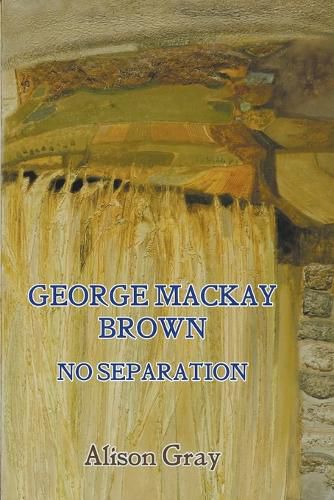Readings Newsletter
Become a Readings Member to make your shopping experience even easier.
Sign in or sign up for free!
You’re not far away from qualifying for FREE standard shipping within Australia
You’ve qualified for FREE standard shipping within Australia
The cart is loading…






George Mackay Brown, the poet, novelist and dramatist, is seen by some as not just Orkney’s, but Britain’s best twentieth-century poet - widely praised by Ted Hughes, Seamus Heaney and fellow Orcadian mentor Edwin Muir. Many of his works are concerned with protecting Orkney’s cultural heritage from the relentless march of progress and the loss of myth and archaic ritual in the modern world, a concern further influenced by his own conversion to Catholicism. Alison Gray has written No Separation first and foremost as a faith story, opening up the Catholicism of George Mackay Brown that hitherto has remained quiet, unexplored and not greatly understood. Not a Catholic or religious writer as such, but treating all the subjects of literature as a Catholic would treat them, and only could treat them. She places Mackay Brown’s writings within an Orkney poetics, a shared Orcadian patrimony that is in touch with its own great past whilst simultaneously being deeply connected to the currents of theology and modern intellectual life in the twentieth century and beyond.
$9.00 standard shipping within Australia
FREE standard shipping within Australia for orders over $100.00
Express & International shipping calculated at checkout
George Mackay Brown, the poet, novelist and dramatist, is seen by some as not just Orkney’s, but Britain’s best twentieth-century poet - widely praised by Ted Hughes, Seamus Heaney and fellow Orcadian mentor Edwin Muir. Many of his works are concerned with protecting Orkney’s cultural heritage from the relentless march of progress and the loss of myth and archaic ritual in the modern world, a concern further influenced by his own conversion to Catholicism. Alison Gray has written No Separation first and foremost as a faith story, opening up the Catholicism of George Mackay Brown that hitherto has remained quiet, unexplored and not greatly understood. Not a Catholic or religious writer as such, but treating all the subjects of literature as a Catholic would treat them, and only could treat them. She places Mackay Brown’s writings within an Orkney poetics, a shared Orcadian patrimony that is in touch with its own great past whilst simultaneously being deeply connected to the currents of theology and modern intellectual life in the twentieth century and beyond.